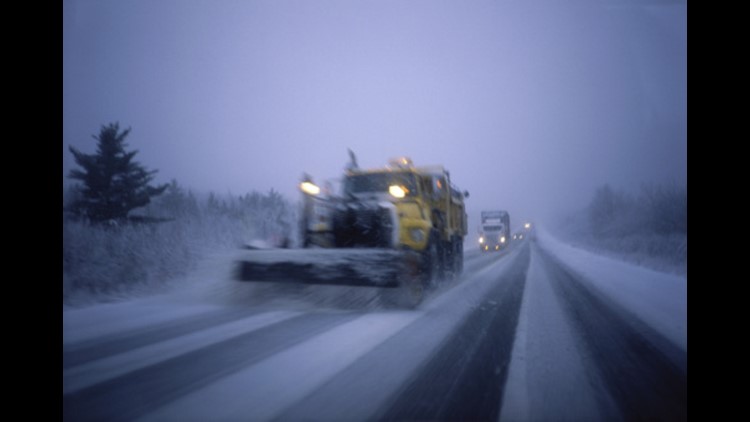This week's cold snap has brought record-low temperatures, freezing rain and heavy snow to much of the United States. But 2017 is still on track to be the second- or third-hottest year ever recorded globally — and scientists say climate change is to blame.
Even as the world gets hotter on average, winter isn't going away, and there will still be extremely cold spells, climate scientists say. And even now, most of the world outside North America is warmer than usual for this time of year. In the Arctic and Alaska, recent temperatures have averaged 10-25 degrees above normal, said Zack Labe, a doctoral candidate studying Earth systems science at the University of California, Irvine.
"Climate change will not occur evenly from place-to-place. While your backyard may be having an intense cold snap, others may be having unseasonably warm temperatures. Climate is all about long-term trends," Labe said in an email.
People across the U.S. have experienced record-low or near-record-low temperatures this week, with some of the coldest weather hitting International Falls, Minn., where the thermometer dropped to negative 36 degrees. But overall, 2017 has seen far more record highs than record lows — one of the clearest signs of global warming, scientists say. Over the last 365 days, there have been roughly three record high temperatures in the U.S. for every record low temperature, according to federal government data.
"We can still expect periods of very cold temperatures, snowstorms, and even days of record low temperatures. However, climate change continues to shift the odds towards more periods of warmer weather and less so for colder weather," Labe said.
President Trump suggested late Thursday that this week's cold weather undermines the science of climate change. Trump tweeted: "In the East, it could be the COLDEST New Year’s Eve on record. Perhaps we could use a little bit of that good old Global Warming."
In the East, it could be the COLDEST New Year’s Eve on record. Perhaps we could use a little bit of that good old Global Warming that our Country, but not other countries, was going to pay TRILLIONS OF DOLLARS to protect against. Bundle up!
— Donald J. Trump (@realDonaldTrump) December 29, 2017
But there's a big difference between weather and climate, scientists say: Weather happens in the short term, while global climate systems influence weather over longer time scales. Daily or weekly weather patterns "say nothing about longer term climate change," said J. Marshall Shepherd, director of the atmospheric sciences program at the University of Georgia and a former president of the American Meteorological Society.
"The clothes that you have on today do not describe what you have in your closet but rather how you dressed for today's weather. The range of clothing that you have in your closet is climate," Shepherd said in an email.
Globally, the world's closet has been shifting from heavy jackets to shorts and t-shirts.
Since modern record-keeping began in 1880, the 10 hottest years ever measured have all been since 1998, according to the National Oceanic and Atmospheric Administration. The three hottest years on record are 2016, 2015 and 2014, in that order. Scientists at NOAA and NASA have said 2017 is likely to snag the second or third spot on the list.
Even this week's cold weather is probably being caused at least in part by global warming, said Jonathan Overpeck, a climate scientist at the University of Michigan.
The Arctic is warming much faster than most of the planet, leading to a dramatic decline in the amount of sea ice that covers the region each winter. That loss of ice has allowed more heat to transfer from the ocean to the atmosphere, causing a weakening of the polar vortex winds over the Arctic. Those winds usually "insulate the rest of the Northern Hemisphere" from freezing Arctic temperatures, Overpeck said. But as the winds have weakened, it's gotten easier for freezing Arctic air to swoop further south, he said.
"That is due to the warming of the Arctic, which in turn is due to human emissions of greenhouse gases and primarily burning of fossil fuels," Overpeck said in an interview.
Arctic warming may also be contributing to the long-term drying of the U.S. Southwest, although the science on that front is less certain, Overpeck said. Unlike most of the rest of North America, the Southwest is warmer than usual right now, and 2017 will "without a doubt" go down as one of the region's hottest years ever measured, Overpeck said.
"This is contributing to our record wildfires in California, and the drying out of vegetation that's leading to those wildfires, and the drying out of the Southwest's water," he said.
Sammy Roth writes about climate change for USA TODAY. He can be reached at sammy.roth@desertsun.com, (760) 778-4622 and on Twitter @Sammy_Roth.



